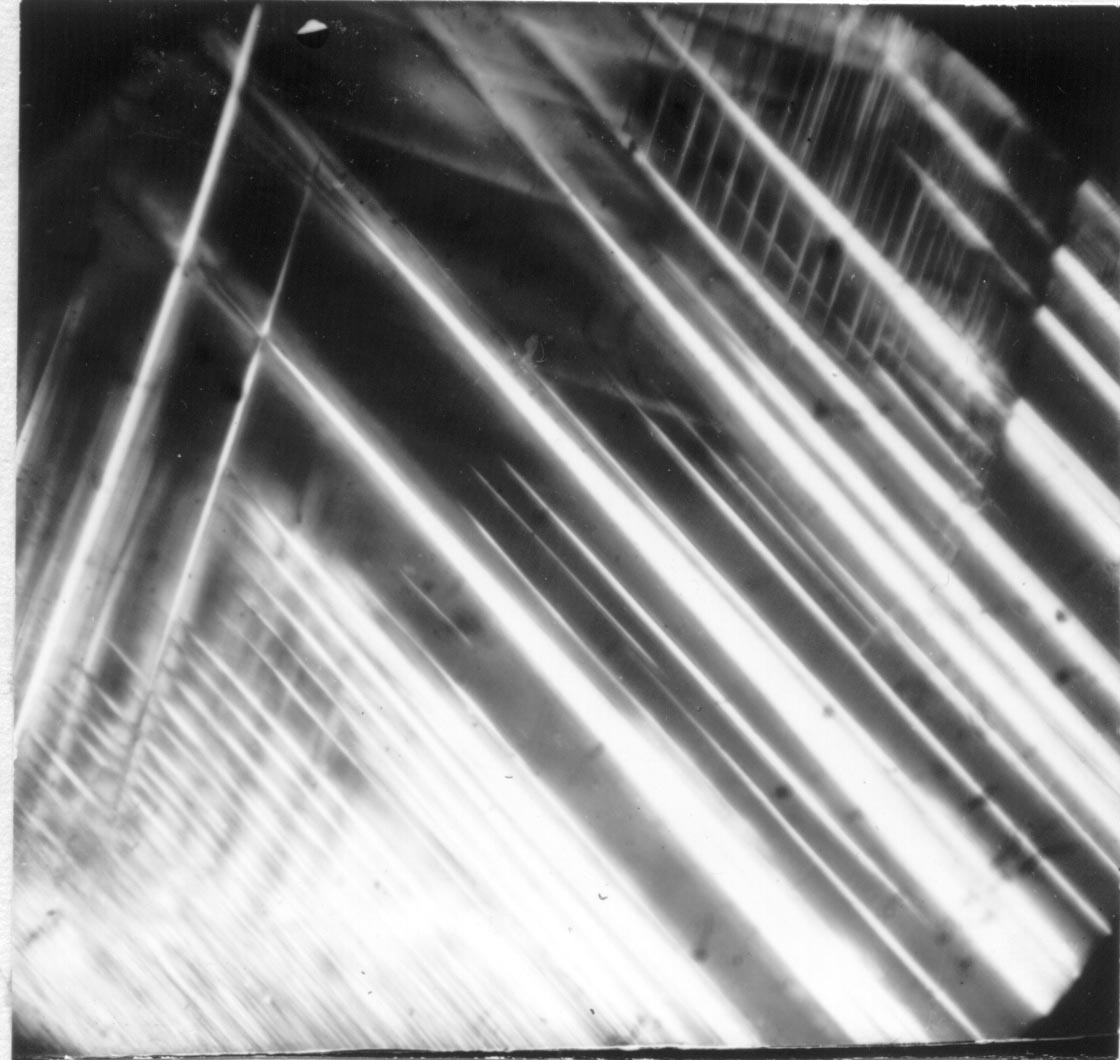NEW FERROELECTRICS

Ferroelectric domains in the RbNbWO6 crystals under
polarized microscope. |
There is a broad family of compounds
A(B,W)3O9 where A = K, Rb, Cs, Tl, whereas B
are cations of different
elements from Li+ to Nb5+ and
Ta5+.
All these compounds have the structure of hexagonal tungsten
bronze type with wide channels along c axis in which cations
A+
are situated. It was found that many of these compounds undergo
ferroelectric transitions. Single crystals some of them,
KNbW2O9,
RbNbW2O9,
TlNbW2O9, and
K3AlW8O27, were grown from
fluxed melts and their
structural features, phase transitions, and physical properties
were studied in details. All the crystals are characterized by complicated
polymorphism in the temperature range from room temperature to
800o C with the formation polar and nonpolar phases and with
rearrangements
of domain structures. In polar state all the crystals show a high
nonlinear optical susceptibility.
Another group of new potential ferroelectrics consists of compounds
A(B,W)2O6 having the structure of "defect"
pyrochlore type with incompletely filled voids in a rigid framework of
(B,W)O6 octahedra.
Here elements A are K, Rb, Tl, and elements
B are Al and Nb.
Some of these crystals exhibit diffuse ferroelectric phase
transitions in the
range of 50-240o C. It was noted that voids in these
crystals can be
reversible occupied by water molecules with the formation of
hydrated forms A(B,W)2O6 · nH2O.
Ferroelectric transitions in these crystals are apparently related
to collective interactions
of A+ cations. Strongly polarized molecules
of absorbed water
can be involved in these processes considerably affecting
the dielectric and nonlinear optical properties.
Among recently studied new ferroelectrics are the
K3Nb3B2O12
crystals and their solid solutions.
Numerous KTP - family
crystals and mixed-layered
Bi-bearing compounds are also typical examples of
such materials.
Main publications:
- Ferroelectrics
with the structure of hexagonal tungsten bronze type.
V.K.Yanovskii,
V.I.Voronkova, and I.P.Klimova. Ferroelectrics, 1983,
v.48, p.239.
- New compounds ABnW3-nO9
with the structure of hexagonal tungsten bronze.
I.P.Klimova,
V.I.Voronkova, and V.K.Yanovskii. Neorg. mater. , 1995, v.31, p.262.
- Peculiarities
of crystal chemistry, polymorphism and dielectric properties of
the K(MxW1-x)2O6
tungstates.
A.A.Bosenko, T.P.Petrovskaya, and V.K.Yanovskii. Neorg.
mater., 1980, v.16, p.1076.
- Neutronographic refining of the atomic structures of
RbNbWO6 and TlNbWO6 crystals.
N.N.Bydanov, T.S.Chernaya, L.A.Muradyan, V.A.Sarin, E.E.Ryder,
A.A.Bosenko, and
V.K.Yanovskii. Kristallographiya, 1987, v.32, p.623.
- Growth, structure and physical properties of
KNbB2O6 and
K3Nb3B2O12
crystals.
V.I.Voronkova, V.K.Yanovskii, I.N.Leont'eva, N.I.Sorokina,
V.I.Simonov. Kristallographiya, 1996, v.41, p. 879.
- Phase transitions and
domain structure of ferroelectric - ferroelastic - superionic
crystals
K3Nb3B2O12 and
their solid solutions.
E.P.Haritonova, V.I.Voronkova, V.K.Yanovskii,
S.Yu.Stefanovich,
and A.V.Mosunov. Ferroelectrics, 1999, v.221, p.73.
- Growth, structure and properties of ferroelectric-
ferroelastic-superionic
K3Nb3B2O12 and
K3-xNaxNb3B2O12
crystals. V.I.Voronkova, E.P. Kharitonova, V.K.Yanovskii, S.Yu.Stefanovich,
A.V.Mosunov, N.I. Sorokina.Crystallography Reports. 2000, V.45, 816.
- Crystal growth and physical properties of
Cs2Nb4O11 and
Rb2Nb4O11 single crystals.
E.P.Kharitonova, V.I.Voronkova, V.K.Yanovskii,
S.Yu.Stefanovich. J. Crystal Growth , 2002, v.237-239, pp.703-706.
- Polymorphism of ferroelectric, ferroelastic, superionic crystals
K3Nb3B2O12
and K3-xNaxNb3B2O12.
E.P.Kharitonova, V.I.Voronkova,
V.K.Yanovskii, and S.Yu.Stefanovich. Inorganic Materials ,
2002, v.38, No.8,
pp.819-824.
Back to Scientific Tasks and Results